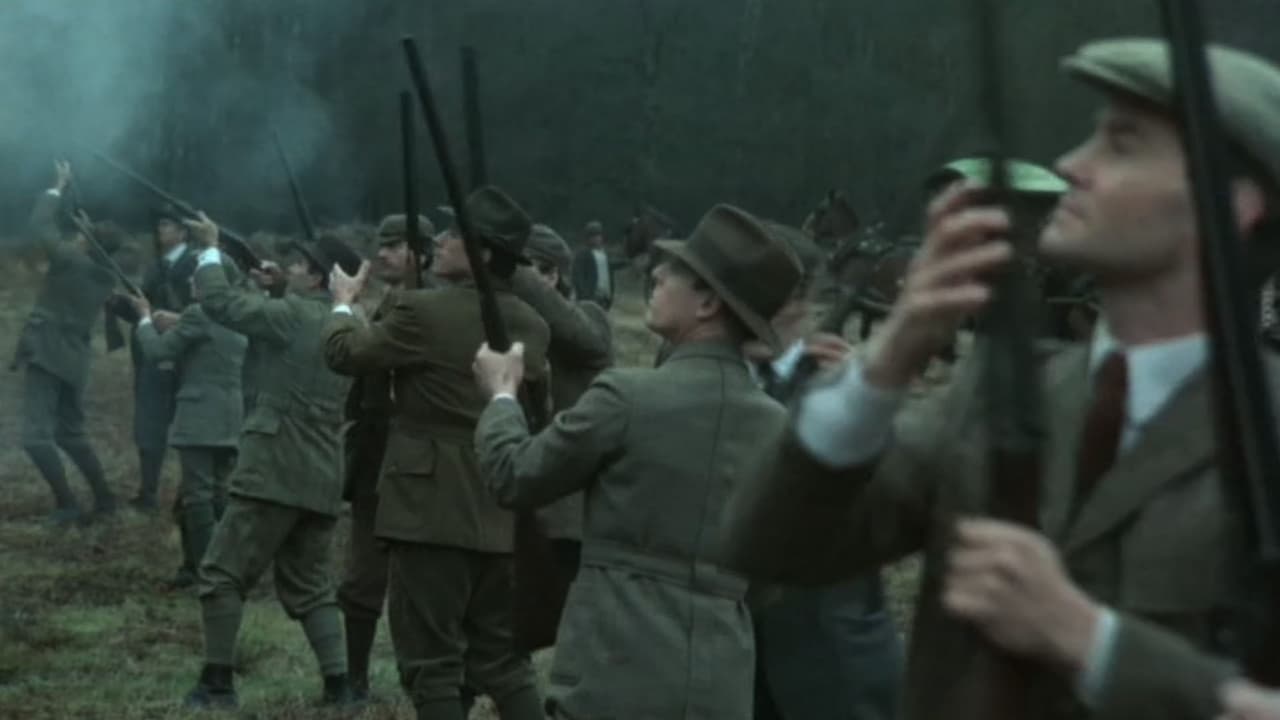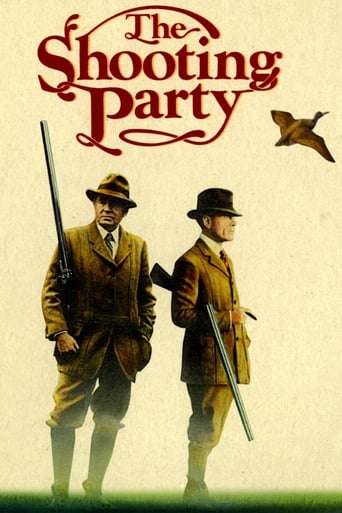

I cannot believe how badly the point of this film must have been missed! I am no snob, but people can't have understood the core ideas behind the film as otherwise it would be regarded as a classic.I thought the film was very sad and a great reflection on a English time and traditions passing. The time of drinking fine wines and eating fresh game will be shortly over with the pending war.James Mason is just perfect in this film! He represents the "good old boy" with principles and values that the younger more competitive Edward Fox misses. This partnership is a beautiful juxtaposition, both understated and acted masterfully.ANyway, slight rant over but please watch again if you were not sure one way or the othergareth
... View MoreNo spoilers, even if it had a plot, because I turned it off before the end.Two things in The Shooting Party work extremely well: and both are castings against type. John Gielgud, the ultimate actor-luvvie, as an early hunt saboteur, and Gordon Jackson as a lairy professional poacher, when he usually did cap-doffing yeoman or butlers. I will say he suffers a bit of accent drift. The casting of James Mason, in his last film, as an aristocrat of the old school doesn't work because James, god bless him, does a sort of bank CEO turn (see Anthony Hopkins in Meet Joe Black), which is not the same thing at all. But that doesn't matter because this is the National Trust version of Brideshead Revisited.For the rest of them, it's the usual suspects playing at toffs, and they have a lot of fun with old cars, guns and billiard tables. Edward Fox, who was to stuck-up black-tie wearing waxworks what Burt Kwouk was to Japanese POW camp commandants, does it on autopilot and it shows. A special mention however for two of the absolutely worst child actors I've seen in a long time. Producer's kids, probably. Sorry kids, I hope you found gainful employment in accountancy later on.It's good that they have plenty to do at this country house, because as far as the audience is concerned, there's NOTHING GOING ON. Some will say that the film lyrically shows the imminent collapse of the English aristocracy on the eve of World War I; I say this film will tell you more about the collapse of the English film industry under the weight of poorly scripted son-et-lumière nostalgia masquerading as historical drama - the sort of thing Stephen Poliakoff does on TV, or used to before budgets got really tight.This, of course, is the point of The Shooting Party - it was trying to show upstart TV that UK cinema could do costume drama so much better in the 1980's. Unfortunately it was wrong. The 1981 TV version of Brideshead Revisited will tell you all you need to know about the decline of the English ruling class, as well as being a rattling good yarn. The Shooting Party isn't so much a yarn as a bit of tinsel.
... View MoreIf you like Merchant/Ivory films, then you will also enjoy this one. It moves slowly but surely as we witness the sun setting on the aristocracy and on the British Empire, set in the microcosm of an English country estate. These people are doomed, in various ways, but, more than that, a way of life that flourished for centuries is about to be extinguished by the slaughter of WWI. James Mason is the lord of the manor and plays the part as if he were born to it. This was his last film and it makes you realize how much he is missed. Edward Fox has a field day playing the weak, tradition bound guest who can't abide being bested and Cheryl Campbell is terrific as his wayward wife. There are many good supporting roles but Gordon Jackson, as one of the "beaters" is a stand-out; his final scenes are brilliantly done. Sir John Gielgud walks through as a protester against the hunt and sparkles in that small role. It is sometimes difficult to figure out who is related to whom since there are a lot of characters, all of whom have some interrelationship. This is a beautiful film, rich in scenary and it captures a time and life that died in the trenches of the Great War. Highly recommended.
... View MoreThe Shooting Party is set in 1913, which is not very long ago, and yet is another world. This was the last year of the old world, and the start of the modern world. The opening narration by James Mason sets the theme: that the world of the haves and have-nots is doomed, and that the future holds great change.This was Mason's last film, and his was a part very well suited to him. He is the great patriarch, head of the family, and benign chief of the great estate. He is not a soppy fool, but he is kind and means well to all. He invites many aristocrats to his estate for a few days of shooting, and these arrive, with their servants.In the house, then, are representatives of much of the world at that time: the upper classes, some British, some foreign, and the lower classes, some servants, some local rustics who will be the beaters for the shoot. The film then shows us how they are all behaving.Both the upper and the lower classes are stuck in their ways, though if anything, it is the upper class which questions whether this is the way things should be. When the shooting pauses for tea, the posh folk sit elegantly but uncomfortably in a clean white marquee, and drink from china, while the beaters look far happier drinking from mugs from a communal urn and chatting amongst themselves.The foreign aristocrats are haughty, and annoy the British by referring to the beaters as "peasants". The British aristocrats are not happy. Two young idealists are in the agony of a forbidden love, others have sham marriages or petty rivalries.The world is one full of love, but much of it frustrated. A boy has a pet duck, which he fears will be shot. Mason has a liking for a local poacher whom he hires as a beater, despite the contempt which the hunt master has for the man. By the end of the film, you feel great liking and sympathy for many of the characters.To get the most from this film, some knowledge of history and British culture is required, but there is much to like in this film without these. The acting and dialogue are good, the setting atmospheric, and what is being said about the people of the time is so very fair. This film does not hammer home any of its points, but shows both the good and the bad in the characters, and lets the viewer decide.All through the film, our present-day knowledge of the slaughter to come in the churned mud of the Somme, Ypres, Paschendale and the Dardenelles stays with us, affecting the way we perceive every nuance. The film makers were clearly aware of this, and take full advantage of it.The ending is one of the most moving I know from any film. Simple, yet very effective.
... View More